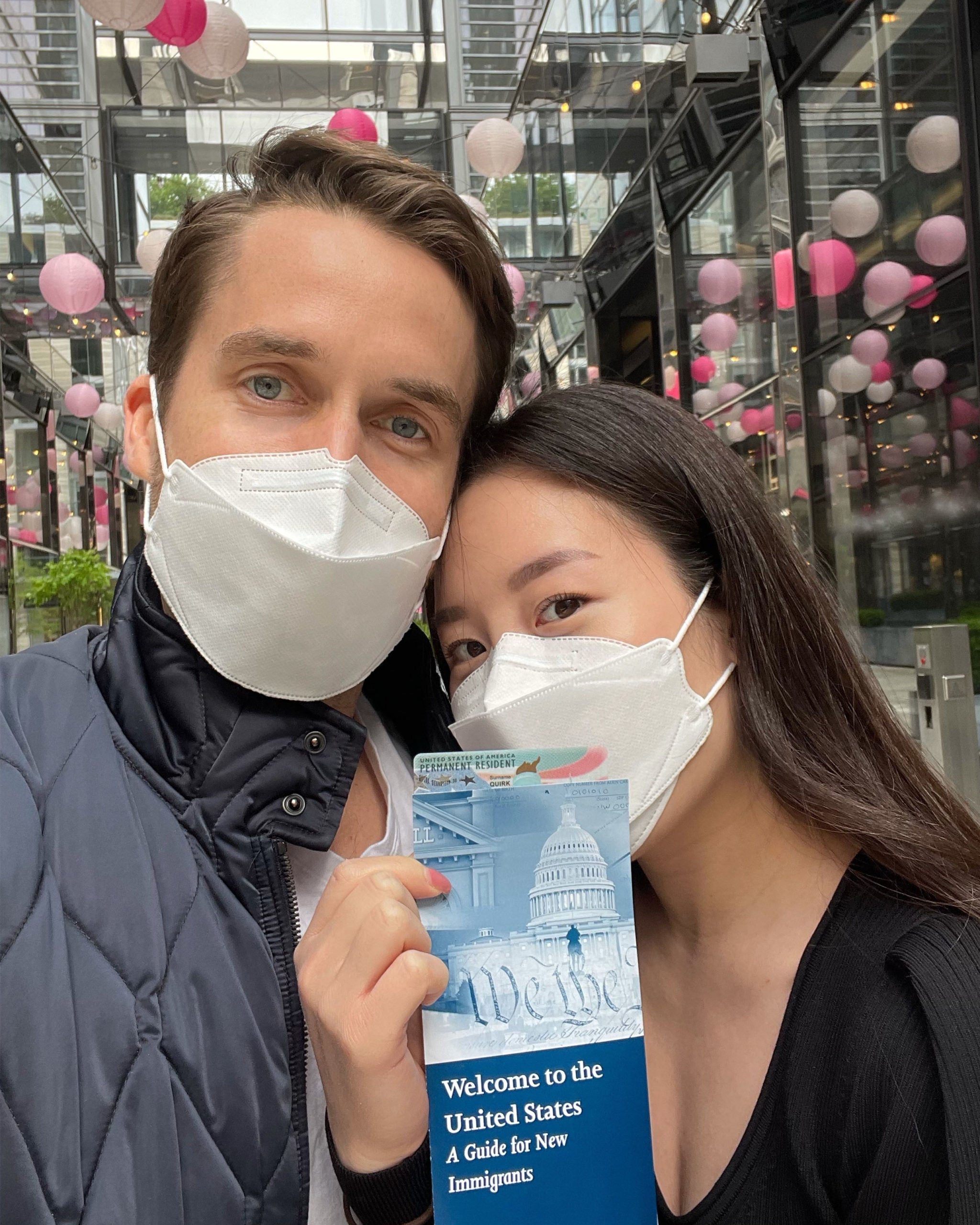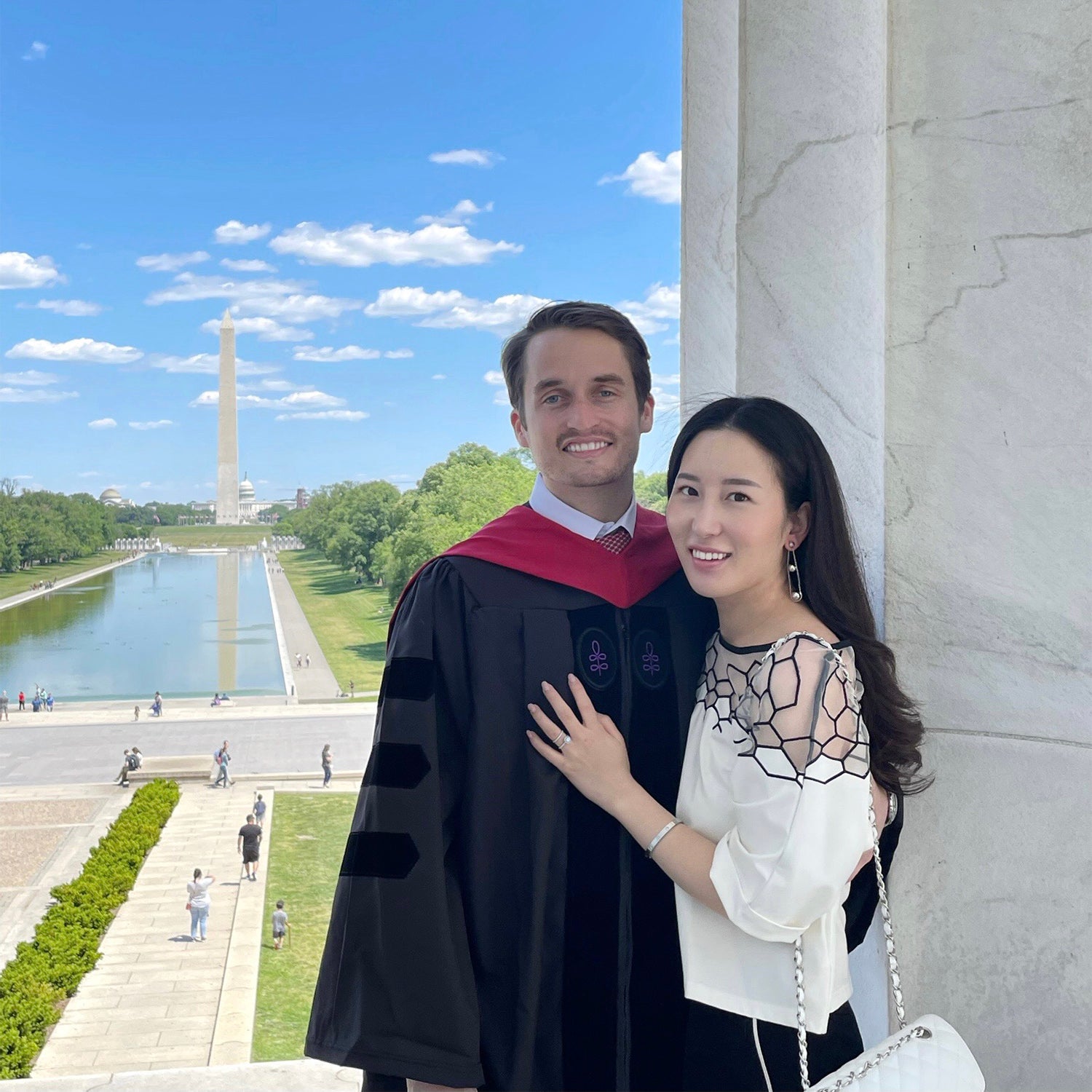Sean Quirk ’21 was stationed on a U.S. Navy destroyer in Yokosuka, Japan when he and a few friends decided to go to a concert in Tokyo one weekend in 2014. At the time, Seungyeon Lee, who also goes by Sue, and who is originally from South Korea but was attending college in Japan, was back in Tokyo after a year in New York. When her friend suggested they go out that evening, she very nearly said no; she was exhausted from her recent move.
Maybe it was the famous Swedish DJ who was supposed to be performing that night, maybe it was something else. But Sue changed her mind and joined her friend. And it turned out that it would be neither the concert venue nor the music that would be most memorable about that evening, because it was the night she and Sean met.
Instantly smitten, the pair started dating. Not long afterward, Sean was transferred to the naval station at Pearl Harbor. Undeterred, Sue and Sean continued their relationship long-distance for a few years.
As his tour was wrapping up, Sean considered his next move. His interests in foreign policy — particularly U.S.-China relations from living in Beijing immediately after college — led him to consider a J.D./M.P.P. program. After learning about Harvard’s support for veterans, and hearing some encouraging words from William Alford ’77, Jerome A. and Joan L. Cohen Professor of Law and director of the East Asian Legal Studies Program, Sean chose a dual degree from Harvard Law School and Harvard Kennedy School.
“I knew I wanted to work in government, either in elected or appointed office,” says Sean. “I thought that a policy and legal education would best enable me to apply my military experience in the future as a policymaker.”
In 2017, during his first semester at the Kennedy School — he would not start HLS courses until 2018 — and after several years of dating long-distance, Sean decided to propose. Sue was visiting on a tourist visa when he popped the question in Boston Common, and she happily said yes.
But given the Trump administration’s strict immigration policies and with visa processing times lengthened, the couple weren’t sure how to best approach Sue’s application for residency. That’s when Sean turned to his friend and fellow veteran, Nate MacKenzie ’17, who had worked as a student attorney at the Harvard Representation Initiative, based at Harvard Law School’s Harvard Immigration and Refugee Clinical Program. Nate connected Sean with Jason Corral — a staff attorney at the Harvard Representation Initiative.
“I told Jason about Sue and about how worried we were about the visa situation,” says Sean. “He was tremendously helpful from day one, and he eventually helped Sue come on a K-1 fiancée visa.”
“Before that, I had had a consultation with a lawyer in Korea just to see what the process would be like and what I would need to prepare for,” adds Sue. “I was shocked when I learned that the process can sometimes cost more than $10,000. We were really lucky we had help.”

The couple felt grateful that Jason, and Harvard Law School, were there for them, even before Sean had begun his legal education. Nine months later – and a mere two weeks before their wedding date on May 26, 2018 – Sue finally received her visa and arrived in Cambridge to tie the knot.
“Luckily, Sue made it to the wedding,” jokes Sean. “It would have been hard without her.”
The next fall, Sean began his first year at HLS, but he says Jason and the clinic continued to be instrumental in the couple’s journey through the immigration process as Sue applied for permanent residency. “During my 1L year, Jason even came to our interview at U.S. Citizenship and Immigration Services in Boston, which went well,” she says.
With Sue now by his side, Sean delved into his studies and pursued a variety of interests at HLS. He focused on international law and began working with Professor Alford, who had originally urged him to apply, and who became one of Sean’s mentors. Professor Alford also served as Sean’s faculty advisor during the January 2020 term, when he traveled to Taiwan on an HLS East Asian Legal Studies grant to research Beijing’s interference in Taiwan’s 2020 elections. Sean’s paper received the Yong K. Kim ’95 Memorial Prize and will be published as a student note in the summer 2021 issue of the Harvard International Law Journal.
Sean’s passion for U.S.-China relations also found an outlet in the “Water Wars” column on Lawfare, a website co-run by Jack Goldsmith, Learned Hand Professor of Law. And Sean’s capstone paper, which he submitted for his joint degree, concerns how the U.S.-China rivalry is reshaping international law. He was invited to present his work to professors and fellow students as a Cravath International Fellow and Salzburg Cutler Fellow this year.
As a veteran, Sean also became a co-director of the university-wide Harvard Veterans Organization. With co-director (and fellow HLS student) Stephen Petraeus ’21, he has worked to connect veterans’ groups like the HLS Armed Forces Association to veteran students and events at Harvard’s other schools. Sean says the group also advocates for issues important to student veterans, as well.
“When the pandemic started, there was a lot of worry that the GI Bill’s housing allowance would get cut because people wouldn’t have to be in Cambridge anymore,” he says. “We coordinated with our alumni leadership in D.C. to see if there was going to be any legislation to change it. They informed us that one of the coronavirus relief packages would ensure that the housing allowance remained the same, and we were able to assuage some of the concerns students had.”
Sue also found a community in the group. “The Harvard Veterans Organization offered me an opportunity to meet veteran spouses who became my friends,” she says.
Today, thanks to Jason Corral and the HLS Immigration and Refugee Clinical Program, Sue has her permanent green card, and the couple has relocated to Washington, D.C. as Sean prepares to graduate magna cum laude and join Covington & Burling LLP, an international law firm. He also will be clerking for a federal judge in the United States District Court for the Southern District of New York the following year.
Sean and Sue both say they are grateful to Harvard Law School — not only because of Sean’s exceptional educational experience, which he says will launch him into his new career, but because of all the help its faculty and staff provided throughout Sue’s immigration process.
“We are both so thankful for the support and experiences we’ve had at HLS,” says Sue.
